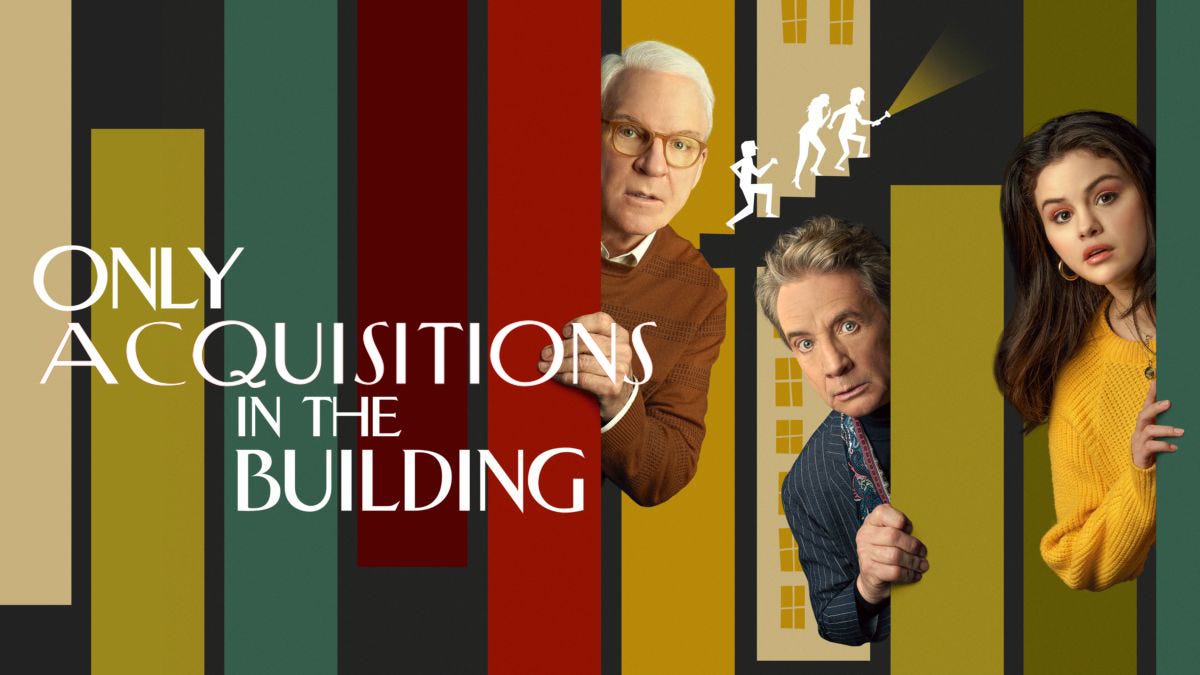#24: Composable Enterprise, Slack, IT Biz, SAP Tables, Low-code in Public Sector
Hi there,
Thank you for joining our bi-weekly meeting of The Slack Fans Anonymous... err... The Boring Enterprise Nerdletter!
As the industry clouds turn grey, the trees go into the low-leaf/no-leaf mode, and compostable enterprise is laid down to fertilize the soil for spring's digital transformation, we welcome the pumpkin-spice latte season. Enjoy our 6 stories before this newsletter is murdered by acquisition by the New York Times or Washington Post!
-Jelena and Paul
Composable Enterprise
Composable ERP has been one of those topics everyone loves to talk about, but no one really knows how it is supposed to work. In their usual “hold my beer” fashion, SAP marketing is now also talking about composable enterprise:
Composable enterprise from an organizational perspective means you can recompose processes dynamically and rearrange based on interchangeable building blocks when needed, without specialist knowledge or a developer[…].
Sweet! There is just, excuse my German, “einen kleinen problemo” (and that’s aside from the actual “blocks” and “composition” parts): data.
As the creators of the Master Data Governance (MDG) solution, SAP must realize that making sure that product X or customer Y mean the same thing across the enterprise is important. “Composable enterprise” will just exacerbate this issue, won’t it? What would be the solution? More MDG, more cowbell? You can get any type of “composable enterprise”, as long as it’s composed of SAP products?
Just like in the case of microservices, I suspect “composableish” might be the best one could get. But that probably won’t stop SAP from talking our ears off about the composable enterprise at the upcoming TechEd. Brace yourselves, folks. JP
IT Might Get To Sit At The Cool Kids' Table
At Enterprise Times, Steve Brooks writes up a review of a report published by ManageEngine on the state of IT. There are some surprising (or not!) factoids in the results of 3,300 decision-makers surveyed:
94% of organizations are decentralizing the IT function. I lived through a previous centralization phase, and I can see the arguments for this current movement.
89% agree that IT is more responsible than ever for business innovation. This sounds hopeful, but a lot of IT folks I talk to don't seem to think they are empowered to make this innovation happen.
86% of business decision-makers see IT as integral to business' overall success. This is an unvarnished good. 86% seems low - do 14% of decision-makers not view IT as a key ingredient? Why?
39% said employees are not included in decisions concerning the tech they will use. I am surprised this is as low as 39%. Across every job I've held in non-consulting organizations, I never felt like I had a voice concerning tech I'd use…and I worked in the IT functions!
39% said they're looking for a new job. DUH.
Brooks concludes: "the mantra of IT leaders becoming part of the business is not new. It seems, though, that the business is now ready to embrace it." Those numbers support that conclusion, and I'd add that it's about freaking time. PM
What do we want? Data from SAP Tables!
“How do I just get the data from SAP tables [and dump it into a spreadsheet]”? Questions like this have been regularly popping up on SAP Community and now other media since time immemorial.
No matter how many dazzling digital boardrooms or Fiori apps are offered, all that the business users seem to want is the raw, unfiltered, estate-bottled data. There have been some solutions for this, such as good old SQVI, its heir apparent Key User Extensibility with analytical queries, as well as third-party tools (e.g. well-known Winshuttle, acquired by Precisely last year).
However, IT is typically reluctant to grant access to these tools, much less invest in educating users on how to use them. The usual excuses are security and data governance. What the users do with the data and how they interpret it is a valid concern. But in general, when it comes to the users and SAP tables, I think it’s like with teenagers: instead of flat out denying, it’s sometimes better to let them experience things in a safe, controlled manner. Resistance is most likely futile. JP
Low-code-ocracy
Over at Acceleration Economy, Bill Doerrfeld writes about low-code/no-code development as pertains to digital transformation in the public sector (though I'm not yet convinced to love the term "digital transformation"). I like reading things that connect use cases to technology, as they usually help me see the "why" more clearly, and Doerrfeld lays out four clear tracks.
Citizen-facing services: make over-the-counter into digital. Make paper permits a thing of the past, as much as can be hoped. Special shout-out here to the idea that digital options are especially helpful to disabled and elderly folks.
Modernizing IT: public sector IT never gets the funding or love it deserves. Old systems can become accessible again by connecting them to low-code platforms.
Innovative services: this is a reframing of the citizen developer idea. Make front-line people empowered to solve their own problems, and watch services soar.
Optimizing planning: make powerful public forums to share planning issues with the public at large. Show digital models of city planning projects.
I can easily imagine these things making an impact in my hometown. I reiterate here the focus on accessibility - when I step outside my developer nerd shell and go to public events, it's easy to see the need for greater accessibility in all forms of computing. And the government should be a place where accessibility is a high priority. To the degree that low-code/no-code tools can increase that in the public sector, count me in. PM
Murder by Acquisition
For over a decade, my family has been using Skype to keep in touch. Weekly, we have a video call with my parents across the ocean. Whenever I travel on business, I find time “to skype” with my husband and kid from a hotel room. Many similar applications have come and gone but we stuck with Skype because it was simple and good. Or rather it used to be. Sadly, ever since it got acquired by Microsoft, each update seems to bring a useless feature while making core functionality more difficult to use. It's now reached the boiling point where we are looking for an alternative.
Skype is not the only application that was made worse by the new corporate overlords. Actually, I can’t even think of one that got better after being acquired… Can you?
Maybe to some it’s exciting that Figma will work with video and 3D models after being bought by Adobe or that Slack is getting more integrated with Salesforce, their new corporate daddy. But as a devoted Slack user, I’m thinking: how about no? There is a great value in applications that do exactly the thing they meant to do really well, and turning them into yet another “jack of all trades, master of none” seems like murder. JP
Slack + Industry Cloud = ?
I use Slack a lot, and I use Microsoft Teams a lot. I love using Slack, and I have the opposite of that feeling for Teams. Slack feels engineered for communication and the experience thereof, Teams feels like an enormous warehouse where you can fit a ton of things, and there's lots of space…but the echo makes talking to someone suck.
I see in the news that Slack (which is now a Salesforce division by acquisition) is "joining forces with Salesforce consulting partners to deliver industry-specific Slack offerings. The first wave of Slack Partner Industry Solutions will address verticals, including financial services, manufacturing, communications, retail, media and technology." Given that I've been relatively interested in industry cloud movement, you might think I'd be down for a bunch of goodies to make their way into Slack. If they fit the comms-first, great-experience paradigm, then hooray! If they are a harbinger of Slack morphing into Teams-but-with-different-color-schemes, then BOO.
One guy in the article says partners can evolve Slack as an "app coordination layer as opposed to an ancillary communications service". Isn't that what Teams has become?
Salesforce, please pluck my tiny voice out of the crowd and listen: don't turn Slack into a giant warehouse of everything. That will destroy Slack. If it gets stuffed full of features it has no business doing, it will rapidly Teams-ify. If people stop enjoying the experience of communicating on your platform, they will stop communicating on your platform. If Slack isn't human communication, what is it? PM
Pumpkin Spice Latte For Starving Artists?
If you love this newsletter, right now is the perfect time to warm our hearts with a nice cup (or two, since there are, you know, two of us) of a pumpkin spice latte. We appreciate your support!











